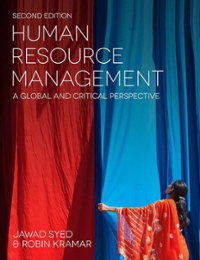In the 'mainstream' English-language texts on HRM, there are hardly any references to resources in other languages
Question:
In the 'mainstream' English-language texts on HRM, there are hardly any references to resources in other languages (Özbilgin, 2004; Sheldon et al., 2014). Exceptions to this rule are some European languages, for example French-, German- and Spanish-language publications, which are very occasionally cited in English-language texts. The inclusion of materials not written in English is hardly encouraged and is often left to the linguistic competence of individual authors. As a consequence, the mainstream writing in the field of HRM remains influenced and dominated by the English-speaking world.
Adler (1991) refutes any claims of universal reach and offers the notion of 'parochialism' in management writing. Clark et al. (1999) identify two forms of parochialism in the international HRM texts: (1) that a sole reliance on English-language sources poses a major challenge; and (2) that the texts often fail to acknowledge the methodological complexities of studying cross-national and international management issues. The limiting impact of the English language appears to be the most insidious as it simply demarcates our knowledge of and imagination related to HRM practice to those geographies where the English language is spoken.
Similarly, the difficulty of formulating overarching conceptual frameworks, theoretical models, and critical approaches is a recurring theme in the international HRM literature. Large-scale empirical studies in this field are rare, and such studies come with long descriptions of the limitations of their method and analysis. However, due to their rarity, great significance is attributed to the studies that are available, and their findings are often overstated, misinterpreted, or used out of context. For example, although Hofstede's work in the 1960s and 1970s challenged the assumption that the theoretical frameworks developed in the USA would be universally applicable (Schneider, 2001), Hofstede's IBM studies were later quoted as a clear indicator of the convergence and divergence of management practices, without much questioning of the nature of his study. Recently, Chung et al. (2014) through their study of nine major Korean MNEs' approaches to subsidiary-HRM, argued that the firms pursue hybridisation through a blending of localisation and global standardisation across various HRM practice areas.
Questions
1 What are the implications of the dominance of English-language literature for theories and practices in HRM?
2 How can scholars and practitioners of HRM benefit from the literature on HRM that has been published in languages other than English?
Step by Step Answer:

Human Resource Management A Global And Critical Perspective
ISBN: 9781137521620
2nd Edition
Authors: Jawad Syed, J; Kramar Syed, Robin Kramar





